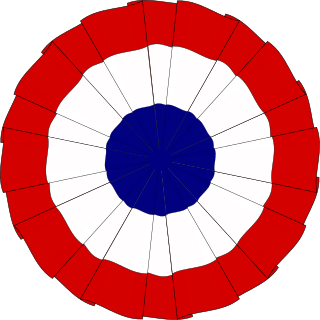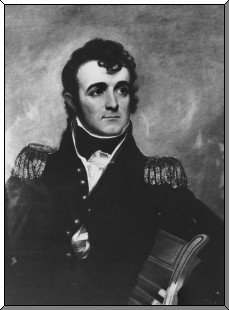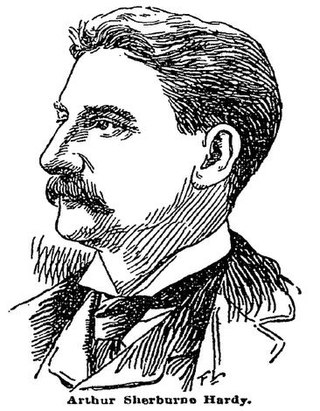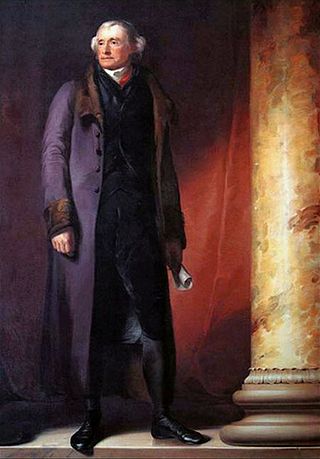Related Research Articles

The Republican Party, known retroactively as the Democratic-Republican Party, was an American political party founded by Thomas Jefferson and James Madison in the early 1790s. It championed liberalism, republicanism, individual liberty, equal rights, decentralization, free markets, free trade, and agrarianism. In foreign policy it was hostile to Great Britain and in sympathy with the French Revolution. The party became increasingly dominant after the 1800 elections as the opposing Federalist Party collapsed.

The United States Military Academy (USMA), also referred to metonymically as West Point or simply as Army, is a United States service academy in West Point, New York. It was originally established as a fort during the American Revolutionary War, as it sits on strategic high ground overlooking the Hudson River 50 miles (80 km) north of New York City. Founded in 1802, it is the oldest of the five American service academies and educates cadets for commissioning into the United States Army. The academic program grants the Bachelor of Science degree with a curriculum that grades cadets' performance upon a broad academic program, military leadership performance, and mandatory participation in competitive athletics.

The 1828 United States presidential election was the 11th quadrennial presidential election. It was held from Friday, October 31 to Tuesday, December 2, 1828. It featured a repetition of the 1824 election, as President John Quincy Adams of the National Republican Party faced Andrew Jackson of the Democratic Party. Both parties were new organizations, and this was the first presidential election their nominees contested. This election saw the second rematch in presidential history, something that would not occur again until 1840.

Henry Dearborn was an American military officer and politician. In the Revolutionary War, he served under Benedict Arnold in his expedition to Quebec, of which his journal provides an important record. After being captured and exchanged, he served in George Washington's Continental Army. He was present at the British surrender at Yorktown. Dearborn served on General George Washington's staff in Virginia.

The First Barbary War (1801–1805), also known as the Tripolitan War and the Barbary Coast War, was a conflict during the Barbary Wars, in which the United States and Sweden fought against Tripolitania. Tripolitania had declared war against Sweden and the United States over disputes regarding tributary payments made by both states in exchange for a cessation of Tripolitanian commerce raiding at sea. United States President Thomas Jefferson refused to pay this tribute. Sweden had been at war with the Tripolitans since 1800. The First Barbary War was the first major American war fought outside the New World, and in the Arab world, besides the smaller American–Algerian War (1785–1795).

Samuel Dexter was an early American statesman who served both in Congress and in the Presidential Cabinets of John Adams and Thomas Jefferson. A native of Boston, Massachusetts, Dexter was a 1781 graduate of Harvard College. After receiving his degree he studied law, attained admission to the bar in 1784, and began to practice in Lunenburg, Massachusetts.

Dennis Hart Mahan (Mă-hăn) [məˈhæn] was an American military theorist, civil engineer and professor at the United States Military Academy at West Point from 1824 to 1871. He was the father of American naval historian and theorist Alfred Thayer Mahan.

Jonathan Williams was an American businessman, military figure, politician and writer. He became Chief of Engineers of the Army Corps of Engineers, was the first superintendent of United States Military Academy, and was elected to the Fourteenth United States Congress.

Joseph Gardner Swift was an American soldier who, in 1802, became the first graduate of the newly instituted United States Military Academy in West Point, New York; he would later serve as its third superintendent from 1812 to 1814, and as chief of engineers of the United States Army from 1812 to 1818. In 1814, Swift was elected as member of the American Philosophical Society.

Thomas Jefferson served as the third president of the United States from March 4, 1801, to March 4, 1809. Jefferson assumed the office after defeating incumbent John Adams in the 1800 presidential election. The election was a political realignment in which the Democratic-Republican Party swept the Federalist Party out of power, ushering in a generation of Jeffersonian Republican dominance in American politics. After serving two terms, Jefferson was succeeded by Secretary of State James Madison, also of the Democratic-Republican Party.
Events from the year 1826 in the United States.
The Mathematical Correspondent was the first American "specialized scientific journal" and the first American mathematics journal, established in 1804, under the editorial guidance of George Baron. The journal published an essay by Robert Adrian which was the first to introduce Diophantine analysis in the United States. In 1807, Adrian, a main contributor to the journal, became editor for one year.

Arthur Sherburne Hardy was an American engineer, educator, editor, diplomat, novelist, and poet.
Thomas Jefferson's involvement with and support of education is best known through his founding of the University of Virginia, which he established in 1819 as a secular institution after he left the presidency of the United States. Jefferson believed that libraries and books were so integral to individual and institutional education that he designed the university around its library.
The history of the United States Military Academy can be traced to fortifications constructed on the West Point of the Hudson River during the American Revolutionary War in 1778. Following the war, President Thomas Jefferson signed legislation establishing the United States Military Academy (USMA) on the site in 1802. In 1817 the academy was transformed by the appointment of Sylvanus Thayer who drastically reformed the curriculum.

Jared Mansfield was an American teacher, mathematician and surveyor. His career was shaped by two interventions by President Thomas Jefferson. In 1801 Jefferson appointed Mansfield as professor at the newly founded United States Military Academy at West Point. Again at Jefferson's appointment, Mansfield served as the Surveyor General of the United States from 1803 to 1812, charged with extending the survey of United States land in the Northwest Territory.
Events from the year 1802 in the United States.

The Military Peace Establishment Act documented and advanced a new set of laws and limits for the U.S. military. It was approved by Congress and signed on March 16, 1802, by President Thomas Jefferson, who was fundamental in its drafting and proposal. The Act outlined in 29 sections the rules, the number of officers and military personnel and the management of provisions that would be granted to the military overall. The Act also directed that a corps of engineers be established and "stationed at West Point in the state of New York, and shall constitute a Military Academy" whose primary function was to train expert engineers loyal to the United States and alleviate the need to employ them from foreign countries. Jefferson also advanced the Act with political objectives in mind.

Charles Davies was a professor of mathematics at the United States Military Academy, notable for writing a series of mathematical textbooks.
Vincent Frederick Rickey is an American logician and historian of mathematics.
References
- ↑ Park, Roswell (1840). A Sketch of the History and Topography of West Point and the U. S. Military Academy. Philadelphia. p. 138.
- ↑ Wagoner Jr., Jennings L.; McDonald, Christine Coalwell (2004). "Mr. Jefferson's Academy: An Educational Interpretation.". In McDonald, Robert M.S. (ed.). Thomas Jefferson's Military Academy: Founding West Point. University of Virginia Press. p. 151 n. 45. ISBN 0-8139-2298-4.
- ↑ Cajori, Florian (1890). The Teaching and History of Mathematics in the United States. Washington: Government Printing Office. p. 94.
- ↑ Rickey, V. Frederick; Amy Shell-Gellasch (2008). Katz, Victor J.; Swertz, Frank J. (eds.). "Mathematics Education at West Point: The First Hundred Years". Loci. 1. National Science Digital Library and Mathematical Association of America. ISSN 1941-9198. Archived from the original on 3 August 2008. Retrieved 14 January 2011.
- ↑ Wood, John (September 1802). A Full Exposition of the Clintonian Faction. Newark. p. 31.
- ↑ Baker, Thomas N. (2008). "Speculations on the Genealogy of Deism in New York, 1700–1850". New York History. 89 (1). New York State Historical Association. ISSN 0146-437X. Archived from the original on 28 March 2010. Retrieved 14 January 2011.